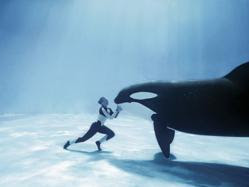We will start off 2016 with a little different format for our leadership lessons. We will invest the next couple of months in a book written by Ken Blanchard entitled Whale Done! It carries the subtitle "The Power of Positive Relationships."
Wes continues his conversation with the whale trainer at SeaWorld.
Wes: "When I was complaining to a friend of mine about it [Wes is having a hard time getting his employees at work to perform well and getting his kids to pitch in around the house], he had a nice way or suggesting that since I was having management problems both at work and at home, we might look for the common denominator."
Trainer: "What was that?"
Wes: "My friend said, 'Did you ever notice, when your life isn't working, who's always around?'"
That's some tough love from Wes' friend! But that is so true ... sometimes, maybe just sometimes; the problem is the person in the mirror.
Trainer: "It takes a long time to build trust and friendship with each of the whales. That trust and friendship is the basis of everything you just saw in the show. These animals are not to different from people. They'll show you when they don't like how you're treating them. You're a businessman, so you know that the whole game these days is satisfying the customer - and a key ingredient of that is satisfying your own people."
Wes: "So, it goes: Build trust ... Accentuate the positive. Is that right?"
Trainer: "Right. We accentuate the positive, not the negative. We pay a lot of attention when the animals does what we ask him to do and performs a task correctly."
Wes: "But what about when he doesn't do it, or does it incorrectly?"
Trainer: "We ignore what he did wrong and immediately redirect his behavior elsewhere ... An important concept to remember is that the more attention you pay to a behavior, the more it will be repeated. We've learned from the killer whales that when we don't pay a lot of attention to what they do wrong, but instead give lots of attention to what they do right, they do the right thing more often."
Wes: "So you're saying it's what you focus on that is the key."
Trainer: "Exactly. We don't accentuate the positive just to get the animals to perform, though. We do it because it's the right thing to do. We treat our animals as individuals, each of which has unlimited capacities for development and accomplishment."
But, our friend Wes is a manager and a parent, and he can't let go of the Trainer's "ignore it" statement.
Wes: "I understand that what you focus on is the key. I still don't get that part about ignoring bad behavior."
Trainer: "When I say we ignore undesirable behavior, I don't mean we do nothing. You might have missed what I said about redirecting. It's all about energy management. It begins with controlling our own attention. A simple but very powerful rule to remember is, if you don't want to encourage poor behavior, don't spend a lot of time on it. Instead we rechanneled the energy."
Wes: "How do you do that?"
Trainer: "If the thing we asked the animal to do is integral to the show, we simply direct his attention back to the original task we asked for and give him another chance to do it right. Other times we direct the animal's attention toward something else we want him to do, something he likes and can do well. In either case, following the redirection, we watch to see if we can catch him doing something right, so we can accentuate the positive .."
Teaching Point: Build Trust.
Accentuate the positive.
When mistakes occur, redirect the energy.
The Trainer puts Wes in touch with a business consultant who frequents SeaWorld and uses the lessons of the whales to teach clients. Next time, we will learn what the Consultant has to say and if it can help Wes.
Donald G Rosenbarger
Senior Vice President
Delta Companies Inc



